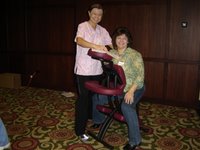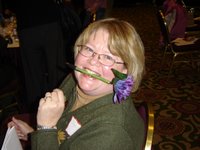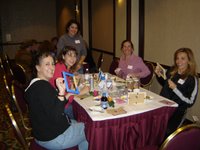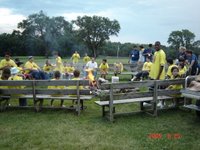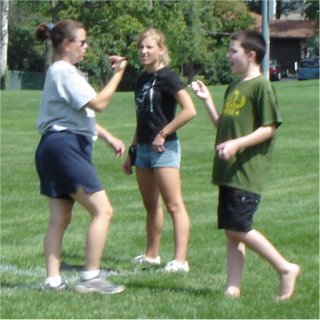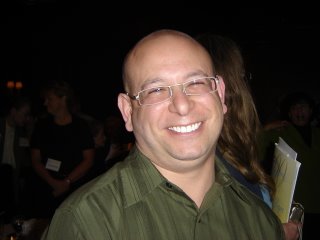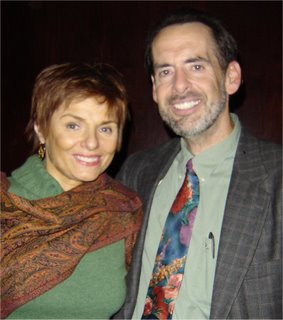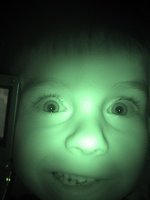Psssst.
Come here.
Want a hot stock tip?
Invest in a battery company.

In my household, we have to keep track of ten hearing aids. The hubby and I have four, and the three kids have six hearing aids. We have an entire kitchen drawer that is devoted to packs of batteries and extra tubes. The drawers are littered with the little orange tabs that are stuck to each battery. Try as I might, I haven't been able to successfully train my kids to walk over to the garbage can (which is right across from the very kitchen drawer I spoke of) and dispose of the sticky orange tab. Instead, the drawer organizer and the cardboard packages are decorated in a random orange pattern.
One day, I took the hubby's car and on my way to a presentation, a battery went out. I changed the battery and stuck the little orange tab on the front of the steering wheel, intending to toss it when I arrived home. I promptly forgot about it until the next time I got in the car a few days later. The bright orange tab was still stuck to the middle of the steering wheel. Apparently the entire family suffers from "Orange Tab Disorder."
Despite their inability to locate garbage cans, the kids have managed to keep track of their hearing aids pretty well. Occasionally, we do have to play "Hunt for the Hearing Aid" around our house. My husband is especially good at initiating this game, for he frequently takes off one hearing aid and forgets just where he put it. This wouldn't be a problem if I kept an immaculate house, but I tend to favor piles of books and papers in random places, so we're often sifting through things around the house to try and locate a hearing aid.
With the addition of our puppy in January, we've had to be more vigilant about keeping hearing aids out of Kaycie's reach. This past summer, I was giving David a haircut outside and he placed his hearing aids on the patio steps. He went inside to take a shower and came out looking for his hearing aids. I had let Kaycie outside, not knowing that his hearing aids were out there. You guessed it-- we found Kaycie outside munching on an earmold. The hearing aids were nowhere to be seen. We located both earmolds, torn to shreds. After hauling everyone outside to join in the hunting game, we located both hearing aids. Despite a nice bite mark on one of them, they both were in working condition. This is the same kid who jumped into the lake with one hearing aid on during the previous summer. The hubby also had a lake adventure with his hearing aid: he had placed his hearing aid on a towel in the boat and accidently flung it overboard. I was able to locate the hearing aid with a scuba mask a few hours later. Today's hearing aids seem to have nine lives, as we were able to bring them all back with a Dry-Aid kit.
With ten hearing aids to keep track of, it's a miracle that we've only lost one of them. My daughter Lauren was at the library one day (this was when she was 9) and her battery went out. She didn't have a back-up battery with her, so she took off her hearing aid and put it in her sweatshirt pocket. While she was waiting for Daddy to check out the books, she decided to do some gymnastic maneuvers on the floor. When she arrived home, the hearing aid was gone. We scoured the library and the parking lot, but the hearing aid with the bright blue earmold, was never found.
When David was three, I noticed that his hearing aid was missing. We were playing outside, so we figured the hearing aid had to be out in the backyard. Joe and I started searching through the grass. We must have looked pretty comical pacing up and down the backyard trying to locate a tiny hearing aid with a tiny earmold. Soon, the neighbors joined in and we covered every inch of the yard, continuing the search into the night with flashlights. We finally gave up the search two days later and had to order another aid. Many months later, we discovered the hearing aid in the bottom of a wicker toy hamper that had never been emptied.
Five people, ten hearing aids and an earmold-loving dog-- never a dull moment in this household.





